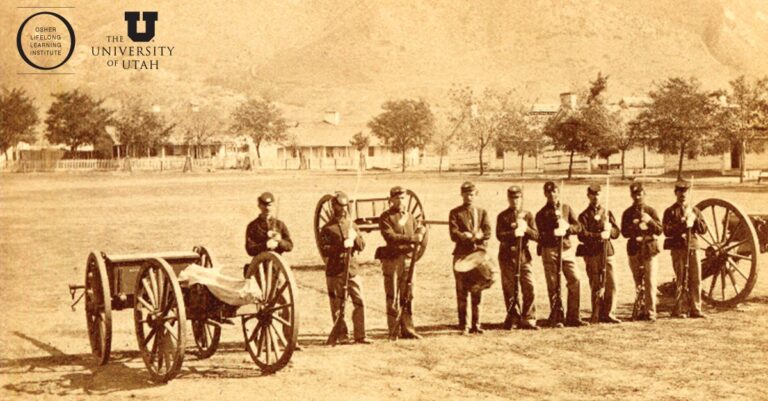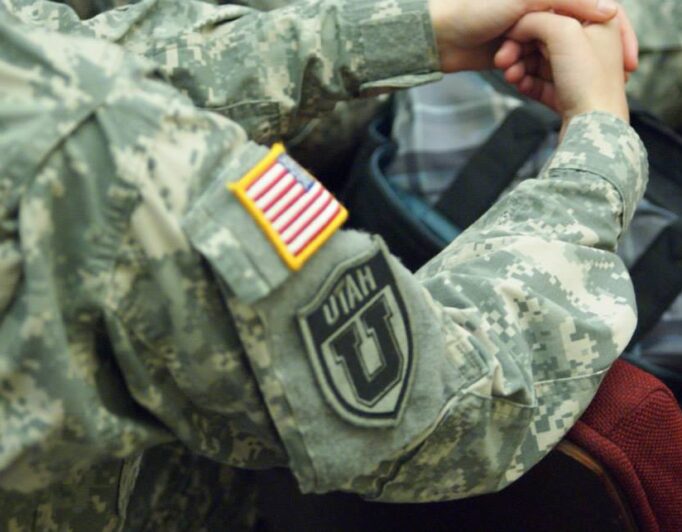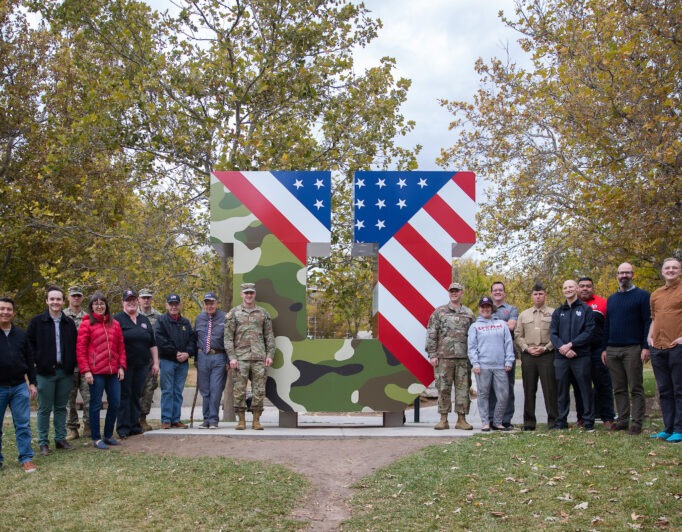Active Military Servicemembers & Veteran Policies
These exceptions apply to active military and veterans and their immediate family members (dependent spouses or children). These are the requirements and deadlines for military servicemembers, veterans, and/or their immediate family members to receive resident student status here at the U.
The requirements for each military or veteran exception are listed, and the student must meet ALL requirements. In all cases, the Residency Division of the University of Utah Admissions Department is the determining body for all military residency exceptions.
Follow all the steps in “Steps to Apply” found below.

- Review laws and rules here - Mandatory Residency Reading
- Do you need to amend your admissions application? - Residency Addendum
- What are the citizenship or immigration requirements for residency?
- Residency available for certain immigration statuses - House Bill 102
- I'm on WUE and I qualify for a military exception, can I be a Utah resident?
- Military and Veterans Residency Exceptions Postcard
Military/Veteran residency exception policies are for:
- Active duty servicemember students and/or their immediate family members
- Veteran students and/or their immediate family members
- Students eligible for Veteran Affairs Education Benefits (G.I. Bill Education Benefits)
Other types of Residency exceptions:
- American Indian exceptions
- Olympic exceptions
- USHE transfer student exceptions
- State or Federal exceptions
- House Bill 118
- House Bill 144
Please note that retroactive residency for past semesters is not granted,
“R512-5.2.1 Application Deadline: Students must meet institutional application deadlines for each term…institutions may not accept applications for resident student status or supporting documentation after the third week of the semester or term for which the student seeks resident student status.”
Steps to Apply
-
Step 1: Read
Utah state law (USHE R512, Resident Student Status 5.2.3) says:
“The burden is on the student to prove that they are eligible for [residency]…“,
…and as such, we expect all students to learn about their options, and make choices based on that learning. Please learn your obligations regarding residency:
- Please read the “Mandatory Reading” to learn about the legal rules regarding residency in Utah.
- Please read through the different residency options, including:
- Reclassification policies for Undergraduate or Graduate students
- Military Exceptions
- American Indian Exceptions
- Olympics Exceptions
- Transfer Students from other Utah schools
- State and Federal Exceptions
- Tuition Waivers
-
Step 2: Choose
Choose the residency application policy that best meets your personal situation. You must meet ALL of the criteria for the policy you choose, so choose the right one for you!
These policies are explained in the“Military Service, Veterans, & Military Dependent Residency Exceptions” section below, which include:
- U.S. Military Veteran and/or their immediate family members
- Eligible Military Members, Veterans, or Dependents using Veteran's Affairs (VA) Education Benefits
- U.S. Military Service Member and/or their Immediate Family Member (Spouse or Dependent Child)
Download the Military and Veterans Residency Exceptions Postcard
-
Step 3: Apply
- Apply for the semester you want to become a resident student as soon as you can, starting on the Applications Open date, found here.
- Work on your residency reclassification only begins with an application, so submit one as soon as possible.
- Applications received* by or before the All Application Deadlines listed here, and are later on completed, will be guaranteed a decision by the first day of the semester.
- You don’t need to have all the required documents at the time you apply. You can submit those documents once you have them ready, up until the Census Deadline.
*Please note: Successful submission of the reclassification application will return you to the Main Residency webpage. Once your application has loaded into our system, you will receive a confirmation email with additional instructions. Please allow up to two business days for this process to occur.
- If you do not receive a confirmation email after 2 business days, please try to submit an application again, or contact the Residency Division for confirmation.
- DO NOT USE A MOBILE DEVICE to submit an application.
- Please only use a supported internet browser listed here
- Apply for the semester you want to become a resident student as soon as you can, starting on the Applications Open date, found here.
-
Step 4: Submit Required Documents
Once your application is submitted, submit all the required documents that your application needs. You can do this with the link below, the Document Submission Form.
You can send those in as soon as you have them ready, up until the last day to work on applications, Census Deadline.
CLICK HERE – DOCUMENT SUBMISSION
YOU MUST COMPLETE ALL THE CRITERIA, INCLUDING ALL REQUIRED DOCUMENTATION.
-
Step 5: Follow Up
The Residency evaluator working on your application will be emailing you about additional steps needed, such as to remind you of what documents are still needed.
Check your UMail account often to find out what your application status is.
If you’re not receiving Residency emails, contact us to update your email addresses for Residency communications.
Visit us:
Student Services Building,
201 S 1460 E,
Salt Lake City, UT 84112Office Hours (All times are Mountain Time Zone):
Monday through Friday – 8:00 A.M. to 5:00 P.M.
Closed Tuesday from 8:00 A.M. to 10:00 A.M. for Staff MeetingsCall us: 801-581-8761, Option 5
Email us: residency@utah.edu



Military Service, Veterans, & Military Dependent Residency Exceptions
-
For a veteran student who is applying, the following criteria is required:
- Military Service Exception Form application
- Copy of proof of service as evidenced by providing one or more of the following:
- DD Form 214 long form, Service 2 copy and Member 4 copy, proving honorable or general discharge
- DD Form 256 Discharge Certificate, for Guard and Reserve members
- NGB Form 22, proof of service for National Guard members
- Note: These forms must indicate:
- Proof of honorable or general discharge
- At least 180 days of active service (see 3.5.1) (see also Utah Code 68-3-12.5 (37)(a)(i)(A))
- If less than 180 days of honorable or general discharge, veteran’s who incurred an actual service-related injury or disability while in the United States Armed Forces (see 3.5.2) may provide documentation in addition to their DD-214 of the service-related injuries and/or disability
- Note: These forms must indicate:
For the immediate family member (Spouse or Dependent Child) of a U.S. Military Veteran who is applying, the following criteria is required:
- Military Service Exception Form application
- Copy of the veteran's 1040 filing* from most recently completed tax year verifying they claimed you as a tax co-signee or dependent (*Note: Other forms of official documentation of immediate family member of a U.S. veteran may be considered on a case by case basis.)
- Copy of proof of service as evidenced by providing one or more of the following:
- DD Form 214 long form, Service 2 copy and Member 4 copy, proving honorable or general discharge
- DD Form 256 Discharge Certificate, for Guard and Reserve members
- NGB Form 22, proof of service for National Guard members
- Note: These forms must indicate:
- Proof of honorable or general discharge
- At least 180 days of active service (see 3.5.1) (see also Utah Code 68-3-12.5 (37)(a)(i)(A))
- If less than 180 days of honorable or general discharge, veteran’s who incurred an actual service-related injury or disability while in the United States Armed Forces (see 3.5.2) may provide documentation in addition to their DD-214 of the service-related injuries and/or disability
- Note: These forms must indicate:
-
The following criteria is required:
- Military Service Exception Form application
- Signed declaration, found at the bottom of the exception application, is required by Utah law, affirming, “that the eligible person will use the Veteran Benefits under Title 38 U.S.C.” (see 53B-8-102 (8)(g)(ii)
- Evidence of eligibility under Title 38 United States Code – VA educational benefits:
- Note: Students may obtain verification from the VA or online through their eBenefits account. Link: Home – VA/DoD eBenefits
- If you have questions on how to go about this, the University of Utah Office of the Registrar Veteran Services can assist with this process
- Military Service Exception Form application
-
For service member students, the following criteria is required:
- Military Service Exception Form application
- Please submit one of the following:
- Copy of your current military ID card
- Copy of your Leave and Earnings Statement
- Copy of your military orders
- Copy of your Enlistment Contract
- Written statement from your current commanding officer that you are serving in the military
For immediate family members (Spouse or Dependent Child) of service member, the following criteria is required:
- Military Service Exception Form application
- Please submit either criteria #1 OR #2:
- The immediate family member’s current United States military identification card; OR
- The following documentation:
- Copy of the military service member’s 1040 filing* from most recently completed tax year verifying they claimed the immediate family member as a tax co-signee or dependent (*Note: Other forms of official documentation of immediate family member of a U.S. veteran may be considered on a case by case basis.); AND
- Please submit one of the following:
- Copy of the service member’s current military ID card
- Copy of the service member’s Leave and Earnings Statement
- Copy of the service member’s military orders
- Copy of the service member’s Enlistment Contract
- Written statement from the service member’s current commanding officer that you are serving in the military
Residency Military/Veteran Exceptions Application Deadlines
-
Summer 2025
All Summer 2025 Residency Applications are open from January 15, 2025 to tuition deadline May 21, 2025.
- Please submit your residency application by April 1, 2025.
- Applications submitted by the April 1, 2025 deadline, that are complete at that time or completed shortly thereafter, are guaranteed to receive a decision by the first day of the semester.
- A completed application is an application that has all the required documentation submitted
- The last day to submit the application is tuition deadline.
- Applications submitted by the April 1, 2025 deadline, that are complete at that time or completed shortly thereafter, are guaranteed to receive a decision by the first day of the semester.
- Submit all required documents as soon as possible, no later than census deadline June 2, 2025.
- You can continue to submit additional required documentation with the Document Submission Form here until the census deadline June 2, 2025.
- No documents will be received, and incomplete applications will be removed, after census deadline.
- Please Note: Applications submitted between April 2, 2025 to May 21, 2025 are late. We will work on these applications until the census deadline; we cannot guarantee a decision by the first day of the semester.
- Incomplete applications are removed after the census deadline.
- Please submit your residency application by April 1, 2025.
-
Fall 2025
All Fall 2025 Residency Applications are open from January 15, 2025 to tuition deadline August 29, 2025.
- Please submit your residency application by July 1, 2025.
- Applications submitted by the July 1, 2025 deadline, that are complete at that time or completed shortly thereafter, are guaranteed to receive a decision by the first day of the semester.
- A completed application is an application that has all the required documentation submitted
- The last day to submit the application is tuition deadline.
- Applications submitted by the July 1, 2025 deadline, that are complete at that time or completed shortly thereafter, are guaranteed to receive a decision by the first day of the semester.
- Submit all required documents as soon as possible, no later than census deadline September 8, 2025.
- You can continue to submit additional required documentation with the Document Submission Form here until the census deadline September 8, 2025.
- No documents will be received, and incomplete applications will be removed, after census deadline.
- Please Note: Applications submitted between July 2, 2025 to August 29, 2025 are late. We will work on these applications until the census deadline; we cannot guarantee a decision by the first day of the semester.
- Incomplete applications are removed after the census deadline.
- Please submit your residency application by July 1, 2025.
-
Spring 2026
All Spring 2026 Residency Applications are open from September 15, 2025 to tuition deadline January 16, 2026.
- Please submit your residency application by November 1, 2025.
- Applications submitted by the November 1, 2025 deadline, that are complete at that time or completed shortly thereafter, are guaranteed to receive a decision by the first day of the semester.
- A completed application is an application that has all the required documentation submitted
- The last day to submit the application is tuition deadline.
- Applications submitted by the November 1, 2025 deadline, that are complete at that time or completed shortly thereafter, are guaranteed to receive a decision by the first day of the semester.
- Submit all required documents as soon as possible, no later than census deadline January 26, 2026.
- You can continue to submit additional required documentation with the Document Submission Form here until the census deadline January 26, 2026.
- No documents will be received, and incomplete applications will be removed, after census deadline.
- Please Note: Applications submitted between November 2, 2025 to January 16, 2026 are late. We will work on these applications until the census deadline; we cannot guarantee a decision by the first day of the semester.
- Incomplete applications are removed after the census deadline.
- Please submit your residency application by November 1, 2025.
-
Summer 2026
All Summer 2026 Residency Applications are open from January 15, 2026 to tuition deadline May 20, 2026.
- Please submit your residency application by April 1, 2026.
- Completed applications submitted by the April 1, 2026 deadline are guaranteed to receive a decision by the first day of the semester.
- A completed application is an application that has all the required documentation submitted
- The last day to submit the application is tuition deadline.
- Completed applications submitted by the April 1, 2026 deadline are guaranteed to receive a decision by the first day of the semester.
- Submit all required documents as soon as possible, no later than census deadline June 1, 2026.
- You can continue to submit additional required documentation with the Document Submission Form here until the census deadline June 1, 2026.
- No documents will be received, and incomplete applications will be removed, after census deadline.
- Please Note: Applications submitted between April 2, 2026 to May 20, 2026 are late. We will work on these applications until the census deadline; we cannot guarantee a decision by the first day of the semester.
- Incomplete applications are removed after the census deadline.
- Please submit your residency application by April 1, 2026.
-
Starting Summer Semester 2024 onward, all Exception and Addendum applications for Residency (Military/Veteran, American Indian, Olympic Athlete, USHE Transfer Student, and State of Utah Exceptions, Addendum) will have the same deadlines as all Residency Reclassification applications for the following dates:
- Application Open
- Domiciliary Tie Establishment Deadline
- On-Time Application Deadline
- Application Closes
- Document Submission Deadline
- Incomplete Applications Removed
-
- United States Title 18 U.S.C. § 701 states:
- §701. Official badges, identification cards, other insignia
Whoever manufactures, sells, or possesses any badge, identification card, or other insignia, of the design prescribed by the head of any department or agency of the United States for use by any officer or employee thereof, or any colorable imitation thereof, or photographs, prints, or in any other manner makes or executes any engraving, photograph, print, or impression in the likeness of any such badge, identification card, or other insignia, or any colorable imitation thereof, except as authorized under regulations made pursuant to law (emphasis added), shall be fined under this title or imprisoned not more than six months, or both.
(June 25, 1948, ch. 645, 62 Stat. 731; Pub. L. 103–322, title XXXIII, §330016(1)(E), Sept. 13, 1994, 108 Stat. 2146.)
https://uscode.house.gov/view.xhtml?path=/prelim@title18/part1/chapter33&edition=prelim
- §701. Official badges, identification cards, other insignia
- The copying of military ID cards is authorized by the regulations pursuant to law Title 32 Subtitle A Chapter I Subchapter F Part 161—Identification (ID) Cards for members of the Uniformed Services, their dependents, and other eligible individuals (B)(1):
- (b) The guidelines and restrictions of this paragraph apply to all forms of DoD ID cards.
- (1) Any person willfully altering, damaging, lending, counterfeiting, or using these cards in any unauthorized manner is subject to fine or imprisonment or both, as prescribed in 18 U.S.C. 499, 506, 509, 701, and 1001. Section 701 of 18 U.S.C. prohibits photographing or otherwise reproducing or possessing DoD ID cards in an unauthorized manner, under penalty of fine or imprisonment or both. Unauthorized or fraudulent use of ID cards would exist if bearers used the card to obtain benefits and privileges to which they are not entitled. Examples of authorized photocopying include photocopying of DoD ID cards to facilitate medical care processing, check cashing, voting, tax matters, compliance with 50 U.S.C. appendix 501 (emphasis added) (also known as “The Service member’s Civil Relief Act”), or administering other military-related benefits to eligible beneficiaries (emphasis added). When possible, the ID card will be electronically authenticated in lieu of photographing the card.
https://www.ecfr.gov/current/title-32/subtitle-A/chapter-I/subchapter-F/part-161
- (1) Any person willfully altering, damaging, lending, counterfeiting, or using these cards in any unauthorized manner is subject to fine or imprisonment or both, as prescribed in 18 U.S.C. 499, 506, 509, 701, and 1001. Section 701 of 18 U.S.C. prohibits photographing or otherwise reproducing or possessing DoD ID cards in an unauthorized manner, under penalty of fine or imprisonment or both. Unauthorized or fraudulent use of ID cards would exist if bearers used the card to obtain benefits and privileges to which they are not entitled. Examples of authorized photocopying include photocopying of DoD ID cards to facilitate medical care processing, check cashing, voting, tax matters, compliance with 50 U.S.C. appendix 501 (emphasis added) (also known as “The Service member’s Civil Relief Act”), or administering other military-related benefits to eligible beneficiaries (emphasis added). When possible, the ID card will be electronically authenticated in lieu of photographing the card.
- (b) The guidelines and restrictions of this paragraph apply to all forms of DoD ID cards.
- Under Utah law we are required to photocopy military ID’s because we are administering military-related benefits of having Utah residency for tuition purposes under Utah state law.
- Utah Code 53B-8-102 says:
- (8) Notwithstanding Subsection (3), an institution within the state system of higher education shall grant resident student status for tuition purposes to:
- (a) a military service member, if the military service member provides:
- (i) the military service member’s current United States military identification card (emphasis added); and
- (ii)(A) a statement from the military service member’s current commander, or equivalent, stating that the military service member is assigned in Utah; or
- (B) evidence that the military service member is domiciled in Utah, as described in Subsection (9)(a);
https://le.utah.gov/xcode/Title53B/Chapter8/53B-8-S102.html?v=C53B-8-S102_2016051020160701
- (a) a military service member, if the military service member provides:
- (8) Notwithstanding Subsection (3), an institution within the state system of higher education shall grant resident student status for tuition purposes to:
- Utah Code 53B-8-102 says:
- United States Title 18 U.S.C. § 701 states:
-
If you are requesting residency for a spring term, all of the above documentation is required.
For the federal tax return requirement, the you can submit:
- The first two pages of your federal tax return for the filing from the most recently completed tax year verifying that you were not claimed as a tax dependent by out-of-state parents or guardians.
- Copy of your out of state parents’ or guardians’ federal tax return(s) for the filing from most recently completed tax year verifying that they did not claim you as a dependent.
- A signed and dated letter on letterhead from a licensed CPA with contact information, verifying that you will not be claimed on federal taxes for the previous year as a dependent by out-of-state parents or guardians.
- Example: If you are applying for residency for Spring 2024, you can submit either your or your parents’/guardians’ filed federal tax return for 2022 federal taxes verifying that you were not claimed as a dependent by out-of-state parents or guardians, or a signed and dated letter on letterhead from a licensed CPA with contact information, verifying that you will not be claimed on federal taxes for the 2022 tax year as a dependent by out-of-state parents or guardians.
-
Late Application Submissions
An application is considered late if it is submitted after the deadline (see “Residency for Tuition Purposes Calendar” above).
The hard late deadline for application submission is the tuition deadline. No application will be accepted after the tuition deadline for the requested term of reclassification.
Late Documentation
Required documentation (proof of physical presence documents, submission of Utah ties, proof of tax independence documents, etc.) will be accepted through the census deadline of the requested term of reclassification at the latest. Documentation should be submitted as soon as possible prior to this deadline. No documentation will be accepted after the census deadline for the requested term of reclassification.
Students submitting documentation must have a residency reclassification application on file that was submitted by the hard application deadline.
Have Questions?
-
Visit us at:
Student Services Building,
201 S 1460 E, Salt Lake City, UT 84112Office Hours (All times are Mountain Time Zone):
- Monday – 8:00 A.M. to 5:00 P.M.
- Tuesday – 10:00 A.M. to 5:00 P.M. (Staff Meetings every Tuesday morning 8:00 to 10:00 A.M.)
- Wednesday – 8:00 A.M. to 5:00 P.M.
- Thursday – 8:00 A.M. to 5:00 P.M.
- Friday – 8:00 A.M. to 5:00 P.M.
-
Call us:
801-581-8761, Option 5 to speak with a Residency staff member
-
Email us:
-
Join a Zoom Q&A:
